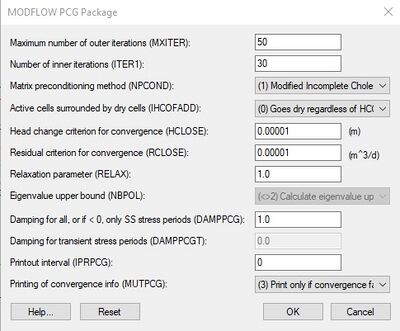|
|
| Line 14: |
Line 14: |
| <blockquote style="margin-top:0px; margin-bottom:0px;"> | | <blockquote style="margin-top:0px; margin-bottom:0px;"> |
| Use this radio group to choose the matrix conditioning method. The default is to use a modified incomplete cholesky method.</blockquote> | | Use this radio group to choose the matrix conditioning method. The default is to use a modified incomplete cholesky method.</blockquote> |
|
| |
| ''Relaxation Parameter''
| |
| <blockquote style="margin-top:0px; margin-bottom:0px;">
| |
| This value is used if the modified incomplete cholesky method is used. Usually, this value is 1.0, but for some problems a value of 0.99, 0.98, or 0.97 will reduce the number of iterations required for convergence.</blockquote>
| |
|
| |
|
| ''Head Change Criterion For Convergence'' | | ''Head Change Criterion For Convergence'' |
| Line 28: |
Line 24: |
| </blockquote> | | </blockquote> |
|
| |
|
| ''Relaxation parameter'' | | ''Relaxation Parameter (RELAX)'' |
| <blockquote style="margin-top:0px; margin-bottom:0px;"> | | <blockquote style="margin-top:0px; margin-bottom:0px;"> |
| The relaxation parameter used with ''Matrix Preconditioning Method''.
| | This value is used if the modified incomplete cholesky method is used. Usually, this value is 1.0, but for some problems a value of 0.99, 0.98, or 0.97 will reduce the number of iterations required for convergence.</blockquote> |
| </blockquote> | |
|
| |
|
| ''Eigenvalue upper bound'' | | ''Eigenvalue upper bound'' |
| MODFLOW |
|---|
| Pre-processing |
|---|
|
MODFLOW Commands |
|
Building a MODFLOW Model |
|
Map to MODFLOW |
|
Calibration |
|
Packages Supported in GMS |
|
Saving a MODFLOW Simulation |
|
Importing MODFLOW Files |
|
Unsupported MODFLOW Features |
|
Run MODFLOW |
| Post-processing |
|---|
|
MODFLOW Display Options |
|
MODFLOW Post-Processing Viewing Options |
|
Reading a MODFLOW Simulation |
| Tutorials |
|---|
| Packages |
|---|
| Flow: |
BCF6, HUF, LPF, UPW |
|---|
| Solvers: |
DE4, GMG, NWT, PCG,
PCGN, LMG, SIP, SOR,
SMS |
|---|
| Other: |
BAS6, BFH, CHD1, CLN,
DRN1, DRT1, EVT1, ETS1,
GAGE, GHB1, GNC, HFB1,
HUF, LAK3, MNW1, MNW2,
OUT1, RCH1, RIV1, SFR2,
STR1, SUB1, SWI2, WEL1,
UZF1 |
|---|
|
The Preconditioned Conjugate Gradient Method (PCG) package is one of the solver packages for MODFLOW supported by GMS.
Maximum outer iterations (MXITER)
This value is the maximum iterations, or calls to the solver. For linear problems, this value can be 1, unless more than 50 inner iterations are required, when maximum outer iterations could be as large as 10. For non linear problems, this values should be larger, but generally less than 100.
Maximum inner iterations (ITER1)
This value is the maximum number of iterations per call to the solver. The default value is 50, and this is sufficient for most problems.
Matrix Preconditioning Method (NPCOND)
Use this radio group to choose the matrix conditioning method. The default is to use a modified incomplete cholesky method.
Head Change Criterion For Convergence
When the maximum absolute value of head change from all cells during an iteration is less than or equal to the head change criterion, AND the residual change criterion is met, solver iteration stops.
Residual Change Criterion For Convergence
When the maximum absolute value of residuals from all cells during an iteration is less than or equal to the residual change criterion, AND the head change criterion is met, solver iteration stops.
Relaxation Parameter (RELAX)
This value is used if the modified incomplete cholesky method is used. Usually, this value is 1.0, but for some problems a value of 0.99, 0.98, or 0.97 will reduce the number of iterations required for convergence.
Eigenvalue upper bound
Damping for all, or if <0, only SS stress periods
Damping for transient stress periods
Printout interval
Printing of convergence info
Reset
This button will change all options to the default state.

The
MODFLOW PCG Package dialog.
